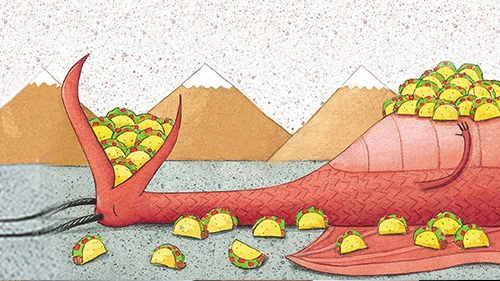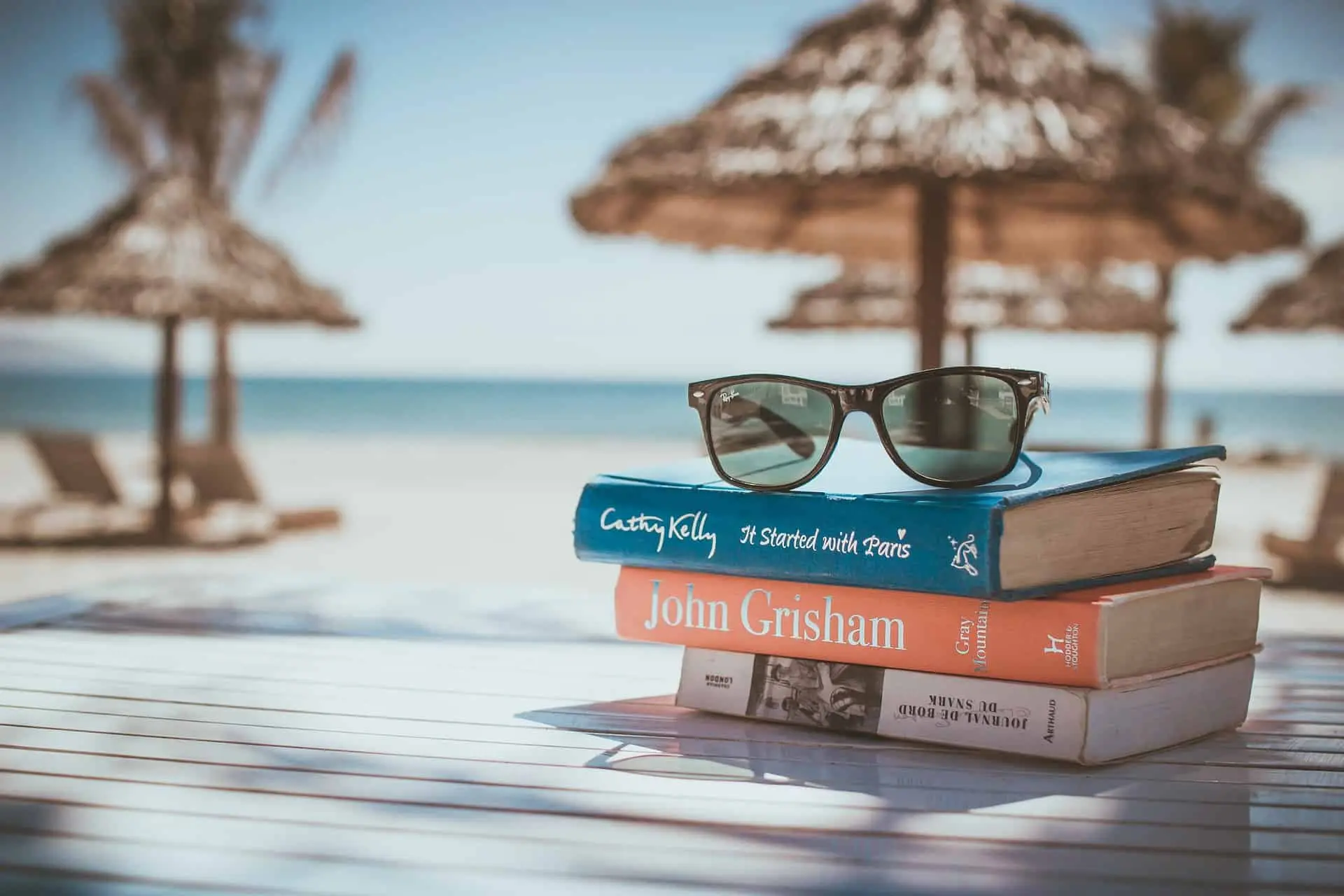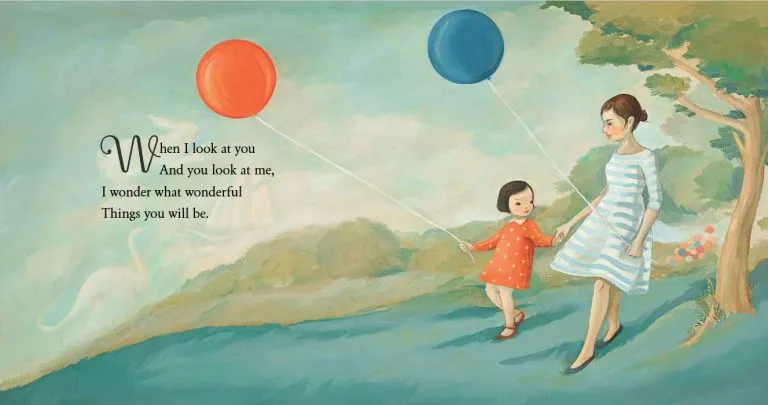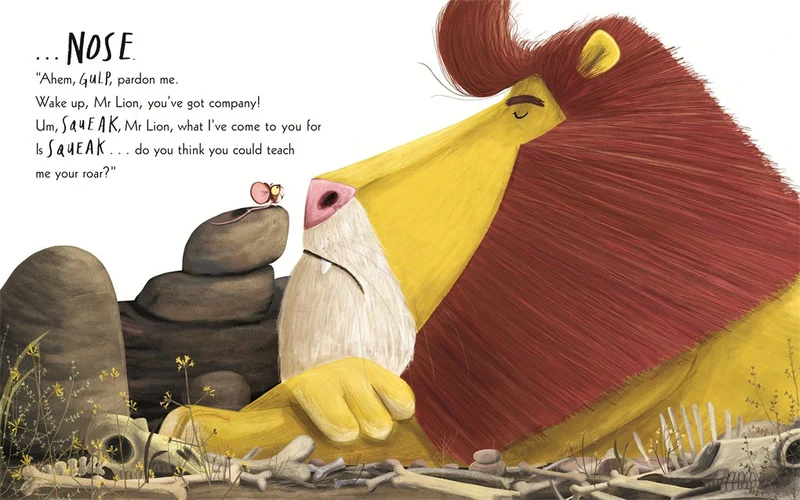A Childrens Bible, by Lydia Millet: An Excerpt
Chapter 2
A shock when we reached the delta, with its braiding and shifting sandbars: unwelcome colonists had beached upon our shores.
Before, when we’d come down to the ocean, the dunes had been deserted except for birds and waving grasses. The waterfront had been ours to wander in peace, with its hermit crabs and driftwood and seaweed.
Now there were others. A barbecue. Meat was grilling, and the smell of it carried. There were beach parasols in bright red-and-white stripes.
Where had they come from? You could only get here by boat . . . yep: there it was. A majestic yacht in cream and gold was bobbing loftily offshore.
[ Return to the review of “A Children’s Bible.” ]
Up the beach, teens played volleyball.
We felt aggrieved but had no strategy. And no moral high ground, either. It was a public place.
The situation rankled.
If we were patient, though, the sun would soon go down and we’d be on our own. Meanwhile we set up our makeshift shelter on the other side of the braided waters—a pavilion with no walls and the threadbare tarps from the toolshed for a roof, their vinyl peeling off in ragged patches.
We tied the tarps to shrubs on the edge of the dunes, balanced them on fishing rods and ski poles. They wouldn’t bear much of a breeze. We had sleeping bags and folded-up clothes for pillows. But at least till dawn came, as the colonists dozed in their luxury berths, we’d have our private empire of salt water and sand.
We watched, munching on soggy sandwiches, as the barbecue-eaters folded their striped umbrellas. From the yacht, a purring and glossy powerboat came up into the shallows.
But hey! What was this?
Sailor types in white uniforms leapt out of the boat carrying bundles. In no time there were sleek-looking tents erected—high-end tents in pearly cream that matched the yacht, alpine-gear logos on the sides. Door flaps and rain flies. Four of them, neatly lined up. A small city above the high-tide mark.
We stared at those handsome tents.
The yacht kids hugged their parents goodnight, as we shuddered. The boat sputtered away. A small fire was built, around which they sat on matching camp chairs. Even their marshmallow sticks were manufactured—we saw them holding the metal skewers over their fire, roasting.
Fine, then. We’d have a fire also. A large bonfire. Our fire would dwarf their fire. It would be magnificent.
We’d brought logs from the woodpile and ancient copies of the New York Observer we’d found for kindling. Thanks to Rafe, a can of gasoline. (Marshmallows were for babies, right? Also, we didn’t have any.) Juicy had won the latest contest and brought an item to destroy, so we stacked up a glorious pile. I set his chosen object on the top of it: an antique wooden pig in a baby bonnet. With very long lashes.
Before long the flames were leaping high. Black smoke and acrid fumes, including gas and possibly lead paint, sailed downwind toward the yacht kids. It served them right, said Rafe. We cackled like witches over the blaze.
After a while headlamps came bobbing toward us. Yacht kids were wading manfully across the delta, barefoot and tanned, their shorts exactly the right length. Some of us stood up proudly. Others adopted more submissive postures.
“Hey, guys!” said the tall one in the lead. A sweep of blond hair fell over his brow. He wore a polo shirt. He was a billboard for Abercrombie & Fitch. “Dudes! What an awesome burn! I’ve got some weed. Anyone want a smoke?”
Grinning broadly.
“Shit yeah,” said Juice.
And so the empire crumbled.
•
At that time in my personal life, I was coming to grips with the end of the world. The familiar world, anyway. Many of us were.
Scientists said it was ending now, philosophers said it had always been ending.
Historians said there’d been dark ages before. It all came out in the wash, because eventually, if you were patient, enlightenment arrived and then a wide array of Apple devices.
Politicians claimed everything would be fine. Adjustments were being made. Much as our human ingenuity had got us into this fine mess, so would it neatly get us out. Maybe more cars would switch to electric.
That was how we could tell it was serious. Because they were obviously lying.
We knew who was responsible, of course: it had been a done deal before we were born.
I wasn’t sure how to break it to Jack. He was a sensitive little guy, sweet-natured. Brimming with hope and fear. He often had nightmares, and I would comfort him when he woke up from them—dreams of hurt bunnies or friends being mean. He woke up whimpering “Bunny Bunny!” Or “Donny! Sam!”
The end of the world, I didn’t think he’d take it so well. But it was a Santa Claus situation. One day he’d find out the truth. And if it didn’t come from me, I’d end up looking like a politician.
The parents insisted on denial as a tactic. Not science denial exactly—they were liberals. It was more a denial of reality. A few had sent us to survival camps, where the fortunate learned to tie knots. Troubleshoot engines, even sterilize stagnant water without chemical filters.
But most of them had a simple attitude: business as usual.
Mine hid the truth from Jack. And he was already suspicious, because in second grade a teacher had leaked damning info about polar bears, sea ice melting. The sixth mass extinction. Jack also worried about penguins. He was a penguin fanatic—knew all the species and could rhyme them off in alphabetical order and draw them.
We needed to have a sit-down, him and me. But when?
I kept putting it off. The guy was only nine. He still couldn’t tell time on a clock that had hands.
Then came the yacht kids, with their medical marijuana and toned physiques. They all went to the same boarding school. And hailed from Southern California, Bel Air and Palos Verdes and the Palisades.
We soon saw it was different there.
“Your folks,” said the alpha male, stoned. They’d carried over their camp chairs: no sitting on towels for them. “They got a compound yet?”
“A compound?” asked Sukey, and took a drag. Held it in. She was sitting a bit too close to him, seemed to be basking in the Abercrombie aura. “You mean like—a pot-growing compound?”
“You’re funny,” said the alpha, and nudged her with a muscular shoulder. Playful.
His name was James. He didn’t go by Jim.
“Hilarious,” said Sukey, passing the joint to Juice.
“You know, a survival home for chaos time? Ours is in Washington,” said another yacht kid. He had a flouncy bandanna tied around his neck.
A really bad idea. Fashion-wise, he seemed to be their equivalent of Low.
“State, not district. Obviously,” he added.
“Ours is in Oregon,” said James. “Huge solar array. Looks like fucking Ivanpah. Eleven backup generators.”
Juice had no idea what they were talking about, but that had never stopped him.
“No, yeah. Eleven seems like overkill,” he said.
James cocked his head, patient but wise.
“With engineering on compounds, redundancy is key,” he explained. “It’s about multiple points of failure. Integrated system design.”
[ Return to the review of “A Children’s Bible.” ]
“No offense,” I said, “but we don’t have a clue what you’re talking about.”
“Speak for yourself,” objected Sukey.
“Oh yeah?” I said. “OK, Sukey. Educate me.”
“Hey, Jack!” she called. “You want dessert? Come over here! These guys brought s’mores!”
Classic deflection. I had to hand it to her.
“I have to go to the bathroom,” said Jack, a bit plaintive.
“Just pee in the ocean, little man,” said James. “The ocean’s large. It may not be able to beat that plummeting pH, but your piss it can handle.”
Jack shook his head, shy.
He’d read a book about scary animals. When you peed in open water, a spiny fish might crawl up the stream of pee and burrow into your penis. A river fish in the Amazon, and possibly mythic, but he’d read the book when he was eight and I suspected he might be recalling it.
“I’ll take him,” I said, and rose to be a big sister.
“It’s number two,” whispered Jack urgently, as we headed up into the dunes.
“Hold on,” I said. “I’ll get the toilet paper.”
Back in the pavilion, pawing through our supplies by the small light of a lantern, I overheard some talk around the bonfire.
“I heard Missy T.’s compound is in Germany,” one yacht kid said to another. “That big bunker under a mountain? A Cold War deal built by the Soviets?”
“Vivos. It’s got its own train station.”
“Hardened against a close-range nuclear blast.”
“The nuclear threat. So quaint.”
“It’s like, if only. Right?”
“The climate deal makes nukes look kind of sweet. Like being scared of cannons.”
“Slingshots.”
“A Hyksos recurve bow.”
“Canaanite sickle-swords.”
I wasn’t up on my Canaanites. Maybe I’d google later.
“They’ve got a DNA vault. Does yours have a vault?”
“Nah. But it does have a seed bank. Non-hybrid.”
“Missy. Man. We’ll never see her ass again. Planes won’t be flying, by that time. Even her daddy’s Falcon 900.”
“Bye-bye, air-traffic control. Bye-bye, Missy.”
“Too bad. Man. Missy gives excellent head.”
“You got that right. Shee-yit.”
I had to keep these guys away from Jack.
•
But it was only at nighttime, relaxed by a strain called the Oracle—which retailed at eight hundred bucks an ounce, James said—that the yacht kids discussed their families’ preparations for the end-times.
By day they played beach volleyball. For hours. They never seemed to get tired of it, and they had genuine talent. I could picture the girls performing in the Summer Olympics, their shining bodies camera bait. Sometimes they took breaks to fool around in the dunes or lie out—I’d thought that practice vanished back in the twentieth, but the yacht kids didn’t care about skin cancer. If they lived long enough to get a bunch of melanomas, they figured, they’d bust out the champagne.
There were two girls and four boys. Their numbers were smaller than ours, but they made up for it in raw personal strength. All of us put together as one team couldn’t beat them. Couldn’t touch them, even.
We made a joke out of it. Our only face-saving option.
At regular intervals they checked in with their parents, fawning. I heard the kid with the neck bandanna compliment his mother on a nasty purple-and-orange sarong.
The parents were their insurance policy, James said. Diplomatic relations had to be maintained.
“But I mean, even if you acted like jerks, they wouldn’t, like, abandon you,” said Jen, on night two.
The yacht parents had appeared in the late morning, sat drinking in a state of soft paralysis—not unlike our own parents’—until the sun went down, then left again to have a nightcap on the deck. A three-person galley staff had served them lunch and dinner on the beach, plus mixed drinks from a portable bar.
The yacht, I’d noticed on a walk down the beach, bore the gold-lettered name Cobra. She wasn’t rented, like the great house, but owned outright by James’s father—a “VC,” as he put it.
That stood for venture capitalist, Terry annoyingly informed us as though we didn’t know.
I mean, I didn’t know, technically, but it did ring a bell.
James’s mother was missing in action. Probably she was alive, but eyes glazed over when you asked. The father had a third trophy wife, four years older than James. She was a model, said a yacht girl named Tess.
I’d packed Jack off to bed, where he lay next to Shel, reading with his headlamp on at the far end of the pavilion. Frog and Toad Are Friends, his favorite book. His second favorite series was George and Martha. A pair of kindly hippos. Platonically devoted to each other.
He could read much more advanced books—books without any pictures at all—and liked those too. But he was nostalgic for his old standbys.
“You’d still be their kids,” pressed Jen. “What, they’re going to leave you outside the walls to drown when the floodwaters come up?”
“It’s about interpersonal capital,” said James. “We prefer not to squander it. What you want is straight A’s. You want a perfect record. Unblemished. You want to maintain a 4.0.”
Sukey was sitting on one side of him, Jen on the other. I sat across from all three of them, neutral as Switzerland. Personally, I felt no urge to hook up with James. He was handsome enough, or whatever, but he reminded me of margarine. Sneakers that were still stiff from the store. Maybe a roll of thick, bleached paper towels.
“But how do you pull it off?” asked Sukey. “I mean. The drugs. The sex. Just for starters. You get stoned. You get laid. Does that get you a 4.0, in Southern California?”
“Well. Those are coping strategies,” said James.
He always had an answer.
“Discretion is the better part of valor,” added Tess. “May I have the bong?”
“Henry IV, Part 1,” said James, passing it over. “Act 5, Scene 4. Falstaff.”
“A common misquote,” said the neckerchief guy. “Sorry, Tess. ‘The better part of valor is discretion, in the which better part I have saved my life.’ Lines 3085–3086.”
“Falstaff plays dead on the battlefield,” nodded James. “Then defends his cowardice.”
The yacht kids had their own game. It was called Memorize Shakespeare.
“Demerit, demerit, demerit,” said Rafe grumpily.
•
By lunchtime on day three we had a food shortage. Someone had left the largest cooler open and gulls perched on the edges, ripping at bread bags with their powerful beaks. Fragments of fruit and cheese littered the sand, and soon even those had been snatched—the gulls were nothing like deer. They didn’t scatter when we yelled, or if they did, it was mostly for show. They came right back.
They got up in our grills, pecking. Gobbling.
So we gave up.
I felt bitter about a packet of cookies I’d been saving.
“We need to make a supply run,” said Terry, when the finger-pointing ended. “Two of us have to go upriver.”
“Or we could go back now,” suggested Rafe. “I miss flush toilets.”
“No way,” said Jen. “I’m not done with James.”
Terry shot her a wounded look. She ignored it.
“Let’s draw straws,” said David.
We used dune grass. We didn’t pull it out—Jack warned us not to hurt the plants—but snipped it neatly with a penknife. The shortest blades went to Terry and Rafe, who carried the empty coolers into a boat and began to row. Terry was visibly sulking.
Once the boat disappeared up the creek, a few of us strolled over to where the yacht kids were feasting on lobster rolls. Dee’d found some hand sanitizer near the chef’s table and was rubbing it on her body like sunscreen—her own supply must have run out. Sukey and Jen and I picked cans of soda from the yacht kids’ cooler, then sat beside Tess under the shade of her umbrella as Low loomed over us, potentially ogling. No room left on her beach blanket.
“It’s our last night,” she said, dipping a shrimp appetizer in red sauce. “We head to Newport in the morning.”
“So soon?” said Sukey.
“Really?” asked Jen.
They both sounded disappointed.
“Supposed to leave yesterday,” said Tess, chewing. “But James talked them into staying. For some reason.”
Sukey and Jen looked at each other. Sukey took a swig from her can, extended one of her long legs, pointed the toes, turned the foot this way and that. Jen grabbed a shrimp from Tess’s cup and popped it in her mouth.
I stared at the shrimps’ little black eyeballs on their stalks.
“Watch. They’ll be fighting over who gets to hook up with that Aryan douchebag,” said Low, as he and I walked away.
When push came to shove, the yacht kids were just too WASP for him. He was a jewel of Kazakh youth, he liked to say—studied history so he could boast about Mongolian hordes. He’d mailed a cheek swab to some genetic-testing service, and the results suggested he was Genghis Khan’s nephew.
Some generations removed. But basically, yeah, he said.
Jack and I went down the beach so he could look for periwinkles (rough, northern yellow, and European, he informed me). He was a bit afraid of the waves, so he didn’t wade in the surf the way I did. Instead he sat by a tide pool for hours, searching for fish and other small creatures. He carefully replaced each rock he moved, worried that he might hurt a crab.
Me, I sat and gazed at the breakers and sky. That was my preferred activity at the seaside. I tried to disappear into the stretches of water and air. I pushed my attention higher and higher, through the atmosphere, till I could almost imagine I saw the earth. As the astronauts had when they went to the moon.
If you could be nothing, you could also be everything. Once my molecules had dispersed, I would be here forever. Free.
Part of the timeless. The sky and the ocean would also be me.
Molecules never die, I thought.
Hadn’t they told us that in chemistry? Hadn’t they said a molecule of Julius Caesar’s dying breath was, statistically speaking, in every breath we took? Same with Lincoln. Or our grandparents.
Molecules exchanging and mingling, on and on. Particles that had once been others and now moved through us.
“Evie!” said Jack. “Look! I found a sand dollar!”
That was the sad thing about my molecules: they wouldn’t remember him.
[ Return to the review of “A Children’s Bible.” ]




